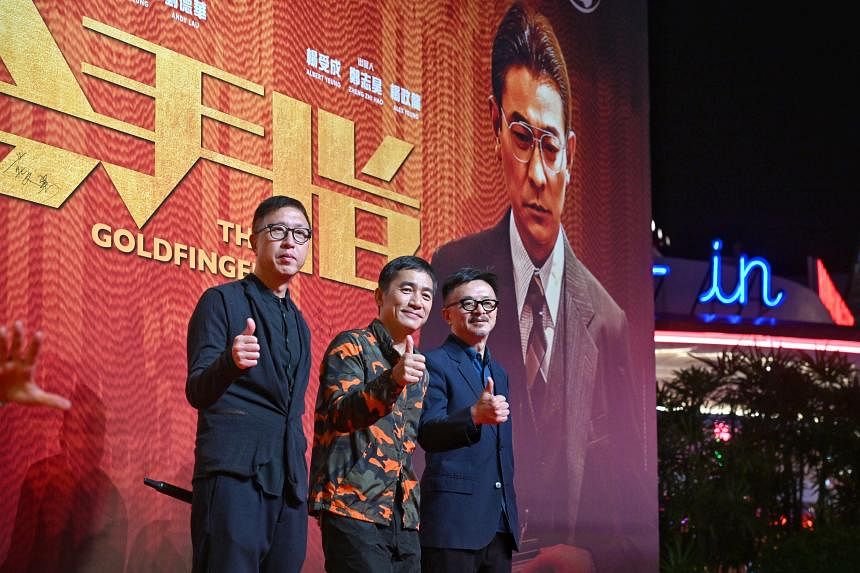SINGAPORE – With a budget of HK$350 million (S$59 million), scriptwriter and director Felix Chong’s latest work The Goldfinger is one of the most expensive Hong Kong films made.
Starring A-listers Tony Leung Chiu Wai and Andy Lau – as well as some of the former British colony’s most famous actors, including Simon Yam, Alex Fong and Philip Keung – it is inspired by the sordid saga of the Carrian Group, a conglomerate which grabbed headlines for its rapid expansion and collapse amid a huge corruption and fraud scandal in Hong Kong in the 1980s.
Leung’s flamboyant conman character is modelled after Carrian’s chairman George Tan, who is rumoured to have died a couple of years ago.
Asked if he tried to contact Tan – an elusive character who had links to Malaysia and Singapore – while he was writing the script, Chong tells The Straits Times during The Goldfinger’s promotional tour in Singapore on Dec 21: “No, I didn’t want to. He was just an inspiration. If I did, then it would have been a documentary or a mockumentary. It was not a route I wanted to take. I wanted the space and freedom to be creative.”
Instead, the 55-year-old film-maker – famous for co-writing crime trilogy Infernal Affairs (2002 to 2003) and directing action thriller Project Gutenberg (2018) as well as the Overheard series of criminal dramas (2009 to 2014) – dug up many cases of financial fraud and studied them before scripting The Goldfinger. It opens in Singapore cinemas on Dec 30.
“When I was in my teens, Hong Kong was rocked by several big scandals involving market manipulation. I wanted to understand why, that’s why I decided to make this movie,” he says.
A graduate of Hong Kong Baptist University’s School Of Communication, Chong is visibly chuffed when told how his love for Hong Kong is clearly reflected in his movies – from the stories to the sets to his choice of cast.
“I have a lot of love and affection for Hong Kong. I grew up in the cinema. I spent the summer of 1986 watching A Better Tomorrow every day,” he says, referring to Hong Kong director John Woo’s gangster classic starring Chow Yun Fat and Ti Lung. “My family ran snack stalls in cinemas, so I’d sometimes watch it three times a day. It was magic. I became an addict. I bought the sunglasses and trench coat that Chow wore in the movie. ”
The Hong Kong movie industry of the 1980s and 1990s was a heady one, pumping out a stream of cinematic gems, from Tsui Hark’s spy drama Peking Opera Blues (1986) to Mabel Cheung’s moving romance An Autumn’s Tale (1987). It sparked a consuming affair with cinema, and inspired Chong to become one of the industry’s most celebrated scriptwriters and film-makers today.
He tells of how he wrote Project Gutenberg, which revolves around a counterfeit ring led by a ruthless and mysterious mastermind named Painter, with Chow in mind.
“My friends told me to approach him, but I felt it was not possible that he would even see me. A friend finally arranged a meeting at the Peninsula Hotel. While walking to Chow’s car after we chatted for two hours, he told me: ‘You’re very cute. You have written such a character. If you didn’t look for me, who did you think you would give it to?’”
Chong readily admits he uses his work to “chase stars”. Besides Chow, Leung and Lau, Chong has worked with some of Hong Kong’s best acting talent, including Louis Koo, Sean Lau and Aaron Kwok.
“They’re all wonderfully creative. You don’t need to tell them what to do; if you did, you would just be hindering them. I just need to build rapport with them and give them a lot of context; they will then do the rest. Basically, I’m filling up their tanks. Once they’re tanked up, they’re raring to go.”
Pointing to recent films such as Lawrence Kwan’s In Broad Daylight (2023), which revolves around abuse and corruption at a care-home facility, and Nick Cheuk’s Time Still Turns The Pages (2023), about a schoolteacher reliving painful memories, Chong is confident the Hong Kong film industry – which has gone into decline – will find its footing again.
“There will be a new generation which will write a new chapter. We can’t use the same old style to shoot movies. Even in Hollywood, formulaic films don’t do well any more. Just look at Barbie, Oppenheimer and Sound Of Freedom. These are not normal films,” he says, referencing the underdog movies which have become 2023’s most popular.
“It shows that audiences and their tastes have changed. We cannot stick to formulaic movie-making, we need to be courageous.”


